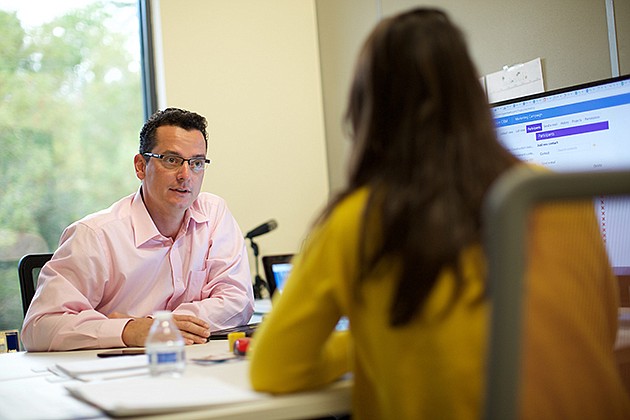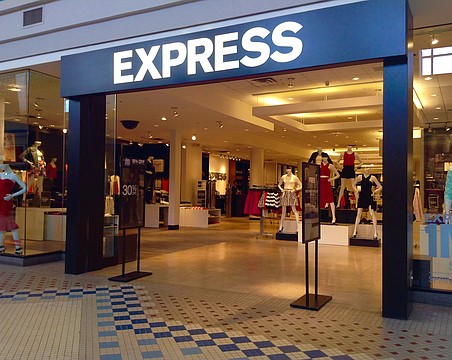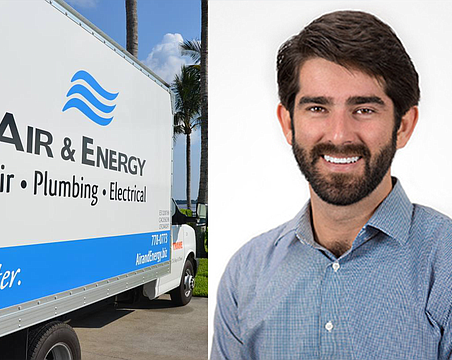Executive Summary
Company. HyperTeam Industry. Software Key. Southwest Florida could become a hub for technology companies.
With a staff of 40 employees in Budapest, Hungary, there is plenty to keep Arpad Solti busy in Europe.
After all, Solti's company, HyperTeam, provides banks, insurance, utilities and other large companies throughout Europe with custom business software. “We are Microsoft experts,” says Solti, president and founder of the company.
How Solti came to open a HyperTeam office in Naples says as much about Florida's receptive business climate as it does about technology. Solti says he considered San Francisco, Las Vegas and even Hawaii as a launching pad for his company's U.S. operations.
Florida wasn't on his radar except that his uncle owns property in the Naples area. “We started as snowbirds,” Solti says.
Initially, Solti visited Naples on vacation with his family. “First it was two months, then four months,” Solti says. “It's beautiful.”
But as HyperTeam's business evolved, Solti says he saw an opportunity to build cloud-based software for small- and medium-sized businesses. He figured the U.S. would be a good launch pad for this new business.
Solti says the ingredients to grow a technology firm are present in Southwest Florida. A welcoming business climate and Florida Gulf Coast University in Fort Myers are big pluses, he says.
When Solti opened HyperTeam's U.S. office in Naples in 2014, Collier County was putting together the Naples Accelerator, a business incubator for local technology startups that also helps foreign companies establish their U.S. operations.
The small business development center at Florida Gulf Coast University has an office inside the Accelerator and invited Solti to apply to become a tenant. “It's not just an office,” says Solti. “It's a real business environment for us.”
In particular, the Accelerator's wide-open spaces can accommodate receptions and “lunch and learn” sessions that HyperTeam organizes for guests. For example, the company plans to sponsor a Hungarian wine-tasting party on March 15 and creating buzz by giving away a one-year subscription to his company's customer-relationship management software in a drawing each month. The giveaway for up to five users is worth $1,200.
Solti, a gregarious entrepreneur everyone knows by his nickname “Arpi,” has quickly immersed himself in local economic development efforts. For example, he traveled with a delegation from Florida Gulf Coast University to France to help recruit technology entrepreneurs to Naples.
Already, colleagues in Europe are turning to him for advice. “Tech companies in Hungary are asking how to set up a business in the U.S.,” says Solti, who travels back to Europe every month.
Solti acknowledges finding technologically savvy employees is a challenge in Naples and he's been networking in the Miami-Fort Lauderdale-Palm Beach area. “My vision is that when I have to hire senior-level experts they'll move here from the other coast,” he says. Currently, the company has four employees in Naples.
In addition, Solti says FGCU graduates could be a source of talent. In Hungary, Solti overcomes the staffing challenge by recruiting interns from the leading business school in Hungary and hiring the good ones for full-time jobs when they graduate. “That's the best way to find talent,” he says.
Pedal to the metal
Collier County's effort to diversify the economy with a business incubator has been successful so far. Now, it needs double the space.
Dubbed the Naples Accelerator, the incubator is now home to 16 fast-growing technology companies and seven more are under consideration, says Marshall Goodman, the president and CEO of the nonprofit organization. “Half the companies here are international,” he says.
Initially, the Naples Accelerator began with $1.3 million in state and local funding. Unrelated political squabbles quashed the initial $5 million funding the organization had hoped for, but Goodman says he's confident those dollars eventually will come as success becomes evident.
In fact, there has been so much interest in the Accelerator that the organization has been forced to install a key-card entry system to keep a steady flow of unannounced visitors from the 10,000-square-foot facility on the second floor of a Kraft Road office building in Naples. Now, meetings are by appointment only.
Goodman says there are two key ingredients to the success of the Accelerator: Florida Gulf Coast University in Fort Myers and successful retired executives looking to mentor and invest in startups.
“Universities are fertile grounds for entrepreneurial ideas,” says Goodman. He says he helped launch four similar incubators when he was provost at San Jose State. “We started building these incubators for students to learn,” says Goodman.
The board of directors of the Accelerator has some corporate heavyweights who live in Naples, including Jean-Pierre Garnier, the former CEO of pharmaceutical giant GlaxoSmithKline.
Goodman says people such as Garnier can help recruit companies to Naples. “We can play that networking,” he says. “You don't have to be in Silicon Valley to be successful.”
The Accelerator could get an additional boost if plans for a venture seed fund moves ahead. Goodman says the organization's board is working on a plan to facilitate a fund from private investors who might back some of the more promising companies at the Accelerator.
Goodman says the seed venture fund could raise as much as $2 million to $10 million, though that money will be spread in $25,000 to $50,000 increments to worthy candidates.
Investors will be circling because the companies at the Accelerator have already been carefully vetted. “They are going to be sharks to blood,” Goodman says.
Goodman, the former chancellor of University of South Florida's Polytechnic campus in Lakeland before it became Florida Polytechnic University, says he proposed the incubator idea to Collier County officials after a talk he gave at the Greater Naples Chamber of Commerce on the subject in 2013.
In 2014 with Goodman at the helm, the Accelerator was created. Plans for a culinary food and beverage incubator in Immokalee have been temporarily put on hold until more state and local funding can be secured.
For now, the Accelerator seeks to double the 10,000 square feet of space it has in Naples, where companies pay from $100 a month for co-work space to $1,500 for an office. “We're out of space here,” Goodman says.






